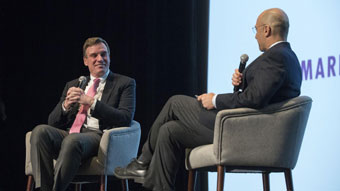An unprecedented presidency
Sen. Mark Warner, Miller Center scholars, and the New York Times’ Peter Baker assess Trump’s early days
Sen. Mark Warner (D., Va.) minced no words.
“Russia massively tried to intervene in our election,” he told the crowd gathered at Charlottesville’s Paramount Theater for a special Miller Center event on April 13. “This is really the first time we’ve seen the force of modern technology, combined with espionage and other techniques, in a way that is fundamentally different.”

Warner, vice chairman of the U.S. Senate Select Committee on Intelligence that’s investigating Russian interference in the 2016 presidential election, also revealed that the Russians have so far released only “about 5 percent of the information that they were able to penetrate” in hacks of U.S. political party databases.
The Russians spread misinformation, Warner told Miller Center Director William Antholis during the onstage discussion, which was part of the annual TomTom Founders Festival.
“The Russians’ ability to manipulate information reached an unprecedented level,” Warner said, adding that what made this particular propaganda effort even more successful than similar Russian efforts to interfere in elections in other countries was that Republican presidential candidate Donald Trump himself was accelerating the spread of fake news by repeating it, tweeting about it, and hammering it home at political rallies.
The ubiquity of social media didn’t help things, Warner said. “On a going-forward basis…I think we have to have a whole reexamination of some of the companies that we have grown to depend upon. The notion that Facebook and Twitter are pass-throughs of information and have no responsibility to curate—I think we have to rethink that.”
Turning to the issue of jobs, Warner said he sees an opportunity to reframe incentives for companies so that they do well when their employees do well.
“Modern American capitalism isn’t working for enough people,” he said. The solution, he added, is for the government to incentivize companies with tax credits to retrain workers for the technologies of the 21st century, rather than encourage them to resurrect the industries of the 1950s.
“Let’s create one standard and let the market drive those investors and those consumers who want to reward companies who actually treat their workforce with a level of dignity, respect, and fair wages,” Warner said. “It’d be better if we were debating these issues rather…than an agenda that’s 20th-century focused.”
BackStory panel
Animosity toward the press “is one area where President Trump is not unprecedented,” said the Miller Center’s Brian Balogh, who joined his cohost of the radio show BackStory with the American History Guys, Ed Ayers, as well as Monticello’s Christa Dierksheide, on a panel discussing how presidential history can illuminate issues and controversies surrounding the Trump administration.
Case in point: Thomas Jefferson had flare-ups with the press too. But he held that the best way to ensure the success of our nascent country was to foster a free press, even subsidizing it.
“What Jefferson didn’t bet on was that the press would become partisan,” said Dierksheide. “The printers of newspapers became the most professional partisans. Everything was told either through a Federalist or Republican set of glasses.”
Adding to the complexity in modern times is how exactly to define “media,” thanks to Twitter, Facebook, and YouTube. “We’ve all become the media,” says Ayers. “Who is not the media?”
Miller Center panel
“I don’t think technology is what makes [President Trump] unusual,” said the Miller Center’s Nicole Hemmer, who shared the stage with Miller Center colleagues Douglas Blackmon and Russell Riley, as well as New York Times White House Correspondent Peter Baker to discuss the Trump presidency thus far.
“He doesn’t share a core philosophy with his party. But he also doesn’t have a core philosophy. That’s what makes it difficult to assess his first 100 days,” Hemmer said. “Most presidents have an approval rating higher than their vote totals. Trump actually has a lower percentage. He’s actually lost support between winning [the election] and coming into office.”
Throughout the lively discussion—including plenty of feedback from the crowd—the panelists offered insights but stopped short of making predictions.
“If we all know there’s a good chance the president is saying things that are untrue, does it matter whether they are true?” asked Blackmon, the panel’s moderator.
Without pause, Hemmer answered with a resounding “Yes!” triggering applause. “The facts on the ground do come home to roost eventually.”
Added Baker: “This is real. It’s not entertainment. We’re not going to shrink from telling the truth as we determine it. I think [the press is] more necessary than ever.”